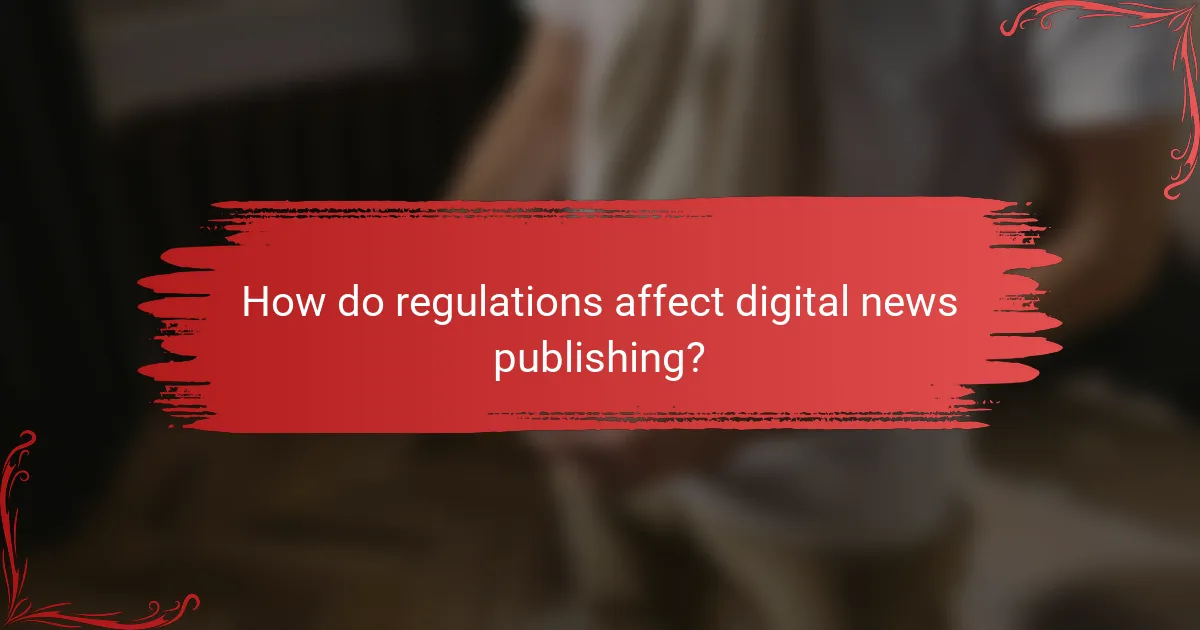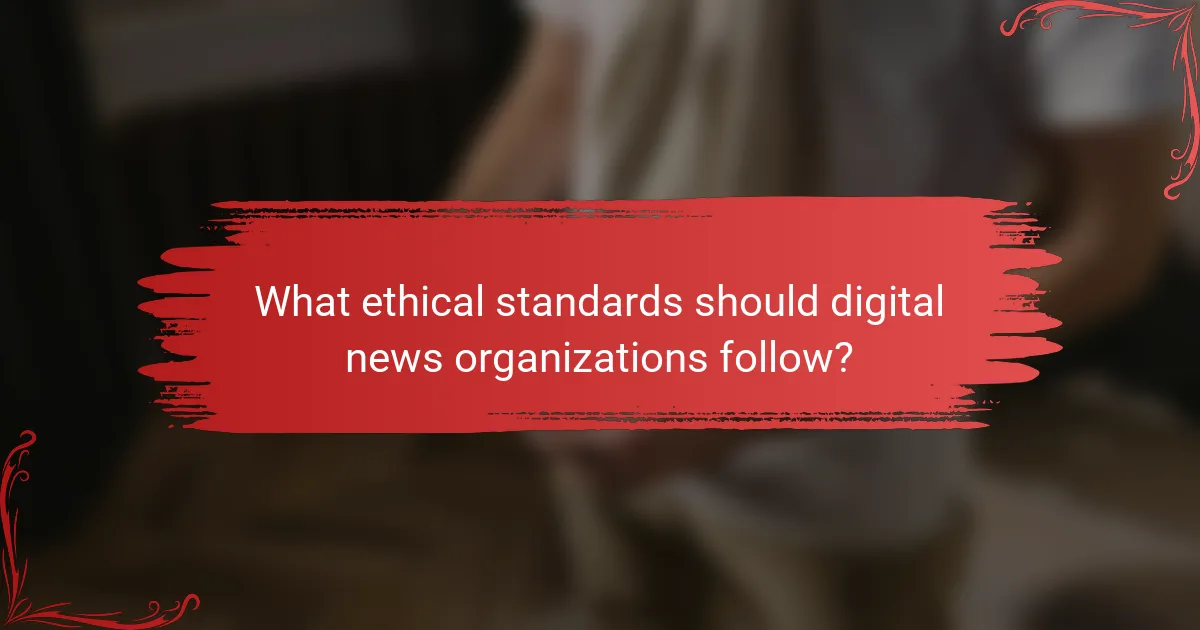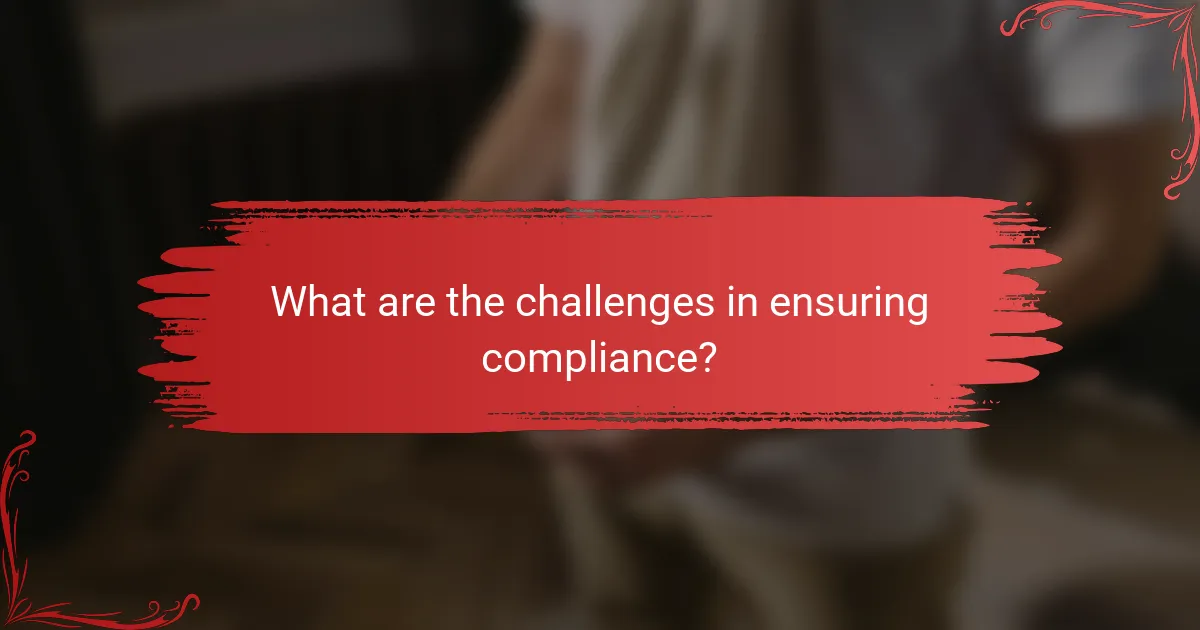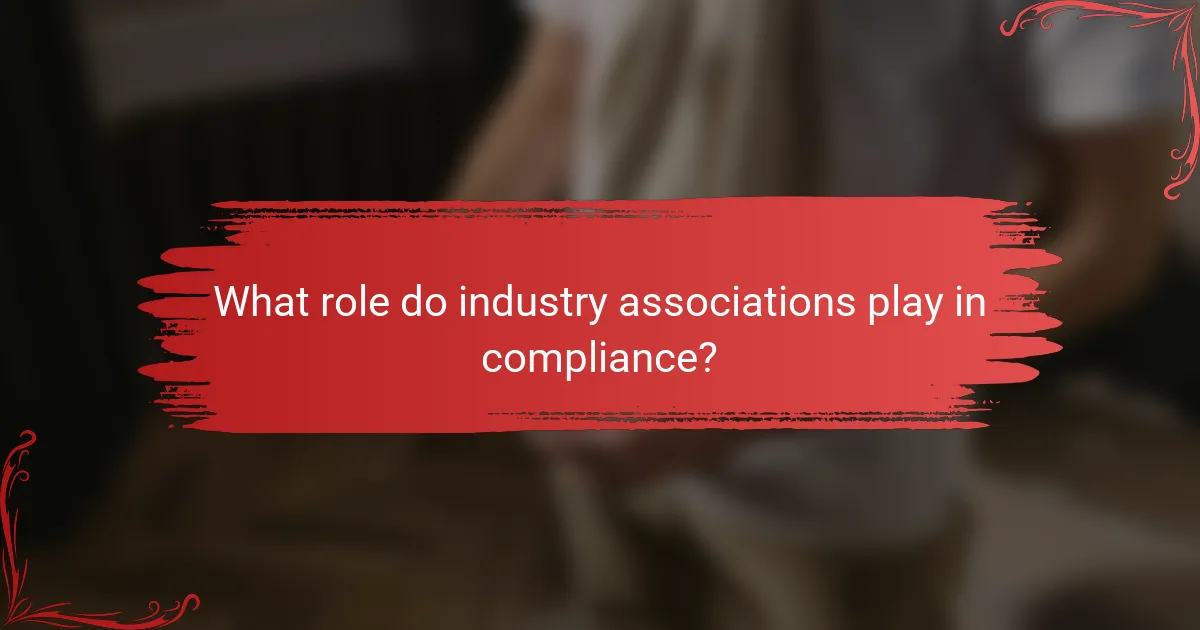Digital news outlets in the US face a complex landscape of legal compliance, including regulations from the Federal Communications Commission (FCC), copyright laws, and data protection requirements. Navigating these regulations is essential for maintaining credibility and protecting user data while upholding journalistic integrity. Additionally, adhering to ethical standards that emphasize accuracy, fairness, and transparency is vital for ensuring that news serves the public interest effectively.

What are the legal compliance requirements for digital news in the US?
Digital news outlets in the US must adhere to various legal compliance requirements, including regulations from the Federal Communications Commission (FCC), copyright laws, data protection laws, and advertising standards. Understanding these obligations is crucial for maintaining credibility and avoiding legal pitfalls.
Federal Communications Commission (FCC) regulations
The FCC regulates interstate and international communications, which includes broadcasting and digital content. Digital news platforms must comply with rules regarding content disclosure, public interest obligations, and accessibility standards. Failure to adhere to these regulations can result in fines or loss of broadcasting licenses.
For instance, news organizations that operate as broadcasters must ensure they provide equal opportunities for political candidates and disclose sponsorship information for any paid content. Regular audits of compliance with these regulations are advisable.
Copyright law adherence
Copyright law protects original works, including news articles, images, and videos. Digital news outlets must ensure they have the right to use any content they publish, whether it’s created in-house or sourced from third parties. This includes obtaining licenses for copyrighted materials and giving proper attribution.
To avoid infringement, news organizations should implement a clear policy for content usage, including guidelines for fair use and proper citation practices. Regular training for staff on copyright issues can help mitigate risks.
Data protection laws
Data protection laws, such as the California Consumer Privacy Act (CCPA) and the General Data Protection Regulation (GDPR) for EU citizens, impose strict requirements on how digital news outlets collect, store, and use personal data. Compliance involves informing users about data collection practices and obtaining consent where necessary.
News organizations should conduct regular assessments of their data handling practices and ensure they have robust privacy policies in place. Implementing secure data storage solutions and training staff on data protection can further enhance compliance.
Advertising standards compliance
Digital news outlets must adhere to advertising standards that govern truthfulness, transparency, and fairness in advertising. This includes clearly distinguishing between news content and advertisements, especially in sponsored articles or native advertising.
To maintain credibility, news organizations should develop clear guidelines for advertising practices, including labeling sponsored content and ensuring that advertisements do not mislead readers. Regular reviews of advertising content can help ensure ongoing compliance with industry standards.

How do regulations affect digital news publishing?
Regulations significantly shape digital news publishing by establishing legal frameworks that govern content, data privacy, and liability. Publishers must navigate these laws to ensure compliance while maintaining journalistic integrity and protecting user data.
Impact of GDPR on US publishers
The General Data Protection Regulation (GDPR) impacts US publishers by imposing strict rules on how personal data is collected, processed, and stored. Even if a publisher operates from the US, if they target or collect data from EU residents, they must comply with GDPR requirements.
Key considerations include obtaining explicit consent from users before data collection and providing transparency about data usage. Non-compliance can lead to hefty fines, often reaching millions of euros, making it crucial for US publishers to understand and implement GDPR standards.
Section 230 of the Communications Decency Act
Section 230 provides legal protection to digital news publishers by shielding them from liability for user-generated content. This means that publishers are not held responsible for what users post on their platforms, allowing for a more open exchange of ideas.
However, this protection comes with responsibilities. Publishers must still monitor content to avoid hosting illegal material, and recent discussions around reforming Section 230 suggest that its protections may evolve. Staying informed about potential changes is vital for publishers to navigate their legal landscape effectively.

What ethical standards should digital news organizations follow?
Digital news organizations should adhere to ethical standards that promote accuracy, fairness, and transparency. These principles guide the creation and dissemination of news, ensuring that information is reliable and serves the public interest.
Journalistic integrity principles
Journalistic integrity is foundational for digital news organizations. This includes commitment to truthfulness, accuracy, and impartiality in reporting. Organizations should establish clear editorial guidelines that prioritize factual reporting and avoid conflicts of interest.
For instance, journalists should verify information from multiple sources before publication. They should also strive to present diverse perspectives, especially on contentious issues, to provide a balanced view.
Transparency in sourcing
Transparency in sourcing is critical for building trust with audiences. Digital news organizations should clearly attribute information to credible sources, allowing readers to assess the reliability of the news. This includes disclosing the nature of sources, especially when using anonymous ones.
Additionally, organizations can enhance transparency by providing context for the information presented, such as the methodology behind data collection or the potential biases of sources. This practice helps audiences understand the news better and fosters informed discussions.
Accountability measures
Accountability measures are essential for maintaining ethical standards in digital news. Organizations should implement processes for correcting errors promptly and transparently, ensuring that inaccuracies are addressed in a timely manner.
Moreover, establishing an independent editorial board or ombudsman can help oversee ethical practices and provide an avenue for audience feedback. This not only enhances credibility but also encourages a culture of responsibility within the organization.

What are the challenges in ensuring compliance?
Ensuring compliance in digital news involves navigating a complex landscape of regulations and ethical standards. Key challenges include keeping up with evolving laws and balancing the rights of expression with legal obligations.
Rapidly changing regulations
Digital news organizations face the challenge of rapidly changing regulations that vary by jurisdiction. Laws concerning data privacy, copyright, and misinformation are frequently updated, requiring constant vigilance. For instance, the General Data Protection Regulation (GDPR) in Europe imposes strict data handling requirements that can affect how news outlets operate.
To manage these changes, organizations should establish a compliance team dedicated to monitoring legal developments. Regular training sessions can help staff stay informed about new regulations and their implications for reporting practices.
Balancing freedom of speech and compliance
Balancing freedom of speech with compliance is a significant challenge for digital news outlets. While journalists have the right to report freely, they must also adhere to laws that prevent defamation, hate speech, and the spread of false information. This balance can be particularly delicate in politically sensitive environments.
News organizations should develop clear editorial guidelines that outline acceptable content while respecting legal boundaries. Engaging legal counsel to review content before publication can help mitigate risks associated with potential legal repercussions. Additionally, fostering an open dialogue about ethical standards within the newsroom can strengthen this balance.

How can digital news organizations implement compliance strategies?
Digital news organizations can implement compliance strategies by establishing systematic processes to adhere to legal regulations and ethical standards. This involves regular assessments, staff training, and staying updated on relevant laws to mitigate risks associated with non-compliance.
Regular legal audits
Conducting regular legal audits is essential for digital news organizations to ensure compliance with applicable laws and regulations. These audits should evaluate content practices, data protection measures, and advertising standards to identify potential legal risks.
Organizations can schedule audits quarterly or biannually, depending on their size and complexity. Engaging legal experts during these audits can provide valuable insights and help rectify any compliance issues before they escalate.
Training staff on legal standards
Training staff on legal standards is crucial for fostering a culture of compliance within digital news organizations. Regular workshops and training sessions can equip employees with knowledge about copyright laws, defamation, and privacy regulations.
Consider implementing a training program that includes real-life scenarios and case studies to enhance understanding. Additionally, providing accessible resources, such as a compliance handbook, can serve as a quick reference for staff when questions arise.

What role do industry associations play in compliance?
Industry associations play a crucial role in helping digital news organizations navigate compliance with legal standards, regulations, and ethical norms. They provide resources, guidelines, and advocacy to ensure that members adhere to best practices and stay informed about changes in the legal landscape.
Resources from the News Media Alliance
The News Media Alliance offers various resources aimed at supporting compliance for digital news organizations. These include legal updates, best practice guides, and tools for understanding copyright laws and advertising regulations. Members can access webinars and workshops that focus on current issues affecting the industry.
Additionally, the Alliance advocates on behalf of its members to influence policy decisions that impact the news sector. This advocacy can lead to more favorable regulations that support journalistic integrity and economic viability.
Guidelines from the Society of Professional Journalists
The Society of Professional Journalists (SPJ) provides a comprehensive code of ethics that serves as a guideline for ethical journalism practices. This code emphasizes principles such as seeking truth, minimizing harm, and acting independently, which are essential for compliance with both legal and ethical standards.
SPJ also offers training and resources that help journalists understand their rights and responsibilities, particularly regarding issues like public records and freedom of information. By adhering to these guidelines, digital news organizations can enhance their credibility and ensure compliance with ethical norms.

What are the emerging trends in digital news compliance?
Emerging trends in digital news compliance focus on adapting to evolving regulations, enhancing transparency, and addressing ethical standards. News organizations are increasingly prioritizing data privacy, content accuracy, and audience trust as they navigate the complex landscape of digital journalism.
Increased Focus on Data Privacy
As digital news platforms collect vast amounts of user data, compliance with data privacy regulations like the General Data Protection Regulation (GDPR) in Europe and the California Consumer Privacy Act (CCPA) in the U.S. is critical. News organizations must implement robust data protection measures and ensure transparency in how they use personal information.
To comply, consider adopting clear privacy policies, obtaining user consent for data collection, and regularly auditing data practices. Failing to adhere to these regulations can lead to significant fines and damage to reputation.
Regulatory Scrutiny on Misinformation
With the rise of misinformation, regulatory bodies are increasingly scrutinizing digital news outlets for accuracy and accountability. This trend emphasizes the need for news organizations to fact-check content rigorously and provide sources for claims made in articles.
Establishing a clear editorial policy that outlines fact-checking procedures can help mitigate risks. Additionally, engaging with third-party fact-checkers can enhance credibility and compliance with emerging standards.
Ethical Standards and Transparency
Ethical journalism is gaining prominence as audiences demand transparency in reporting. News organizations are expected to disclose conflicts of interest, funding sources, and editorial processes to build trust with their audience.
Implementing a code of ethics and training staff on ethical reporting practices can foster a culture of integrity. Regularly reviewing and updating these standards ensures alignment with industry best practices and audience expectations.
